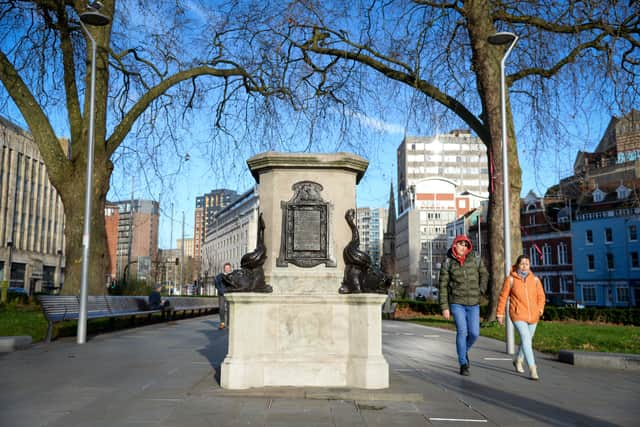Watch: Renewed call for memorial to replace Edward Colston statue by campaigner
and live on Freeview channel 276
A campaigner is calling for a memorial where people can reflect on Bristol’s role in the transatlantic slave trade to be placed on the plinth where Edward Colston’s statue once stood.
The statue of slave trader Edward Colston was piulled down by demonstrators during a protest involving the Black Lives Matter movement over the death of George Floyd in June in 2020.
Advertisement
Hide AdAdvertisement
Hide AdSince then, several unofficial statues have been placed on the plinth since, most prominently a statue of Black Lives Matter activist Jen Reid.
Members of the ‘Colston 4’, who helped topple the statue, were found not guilty of criminal damage by a jury in January.
Mark Steeds, a local historian and member of a group called Countering Colston wants to see a ‘memorial to the victims of enslavement’ in its place.
He also wants people who worked hard for the abolition of the slave trade to be remembered for their role.
Advertisement
Hide AdAdvertisement
Hide AdAccording to a website run in partnership with Bristol City Council on the slave trade, Bristol was the first city outside of London to set up a committee for the abolition of the slave trade in 1788.
In the same year around 800 people volunteered to sign the first petition against the slave trade.


Mr Steeds said: “Bristol’s unique selling point is the very people who fought against the slave trade.
“Many petitioned, many went on sugar boycotts. They did all manner of things to get abolition and later emancipation.
Advertisement
Hide AdAdvertisement
Hide Ad“Then they fought hard for the Americans to give up their slaves though these people haven’t been recognised.
“Also, the freedom fighters like Sam Sharpe from Jamaica. There are loads of those people who haven’t got a voice or peoples knowledge of them has been diminished because no one knows about them.”
Mr Steeds also said it was important people living in Bristol remember the role the city played in the transatlantic slave trade.
He added: “Myself and other really think it’s important that when Bristol was the preeminent trading port in the world between the 1720s and the 1740s and it needs to recognize the part it played.
Advertisement
Hide AdAdvertisement
Hide Ad“It needs to have somewhere for people to remember and reflect, somewhere to go like the cenotaph or something like that.”
Bristol City Council has not yet said what will replace Colston’s statue, if anything.
Comment Guidelines
National World encourages reader discussion on our stories. User feedback, insights and back-and-forth exchanges add a rich layer of context to reporting. Please review our Community Guidelines before commenting.